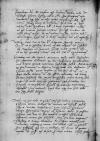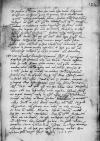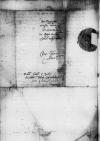List #253
Bona Sforza do Ioannes DANTISCUSCracow (Kraków), 1525-07-05
| odebrano Toledo, [1525]-10-22 Rękopiśmienne podstawy źródłowe:
Publikacje:
| ||||||||||||||
Tekst + aparat krytyczny + komentarzZwykły tekstTekst + komentarzTekst + aparat krytyczny
... et egregio
Curia
Magnifice et egregie, sincere nobis dilecte.
Prima huius habuimus litteras Strenuitatis
Tuae de datis
Scripsimus nos et
Nunc tamen habuimus novissimas litteras a magnifico Ludovico Aliphio secretario et oratore nostro, sub data Neapoli XVIII mensis Iunii, quibus nobis significavit relaxatam iam sibi fore omnium bonorum possessionem praeter castellum Barense, quod ipse castellanus declaravit se dimittere non debere, nisi trinis caesareis compellatur litteris, et propterea ipse Ludovicus scribit nobis expedivisse celerem postam ad Tuam Strenuitatem cum plenissimis informationibus super his et aliis multis, ad quae nos ibidem referimus illudque mirari non sufficimus, quod Strenuitas Tua in his ultimis nobis significavit litteris a mense Septembri nullas ab ipso Ludovico habuisse scripturas, cum ipse scribat se eidem plures misisse, et nos credimus ita fore, sed et nobis idem contigit, quod nunc a dominis Welseris litteris nostris requirimus.
Utcumque nunc tria a Tua Strenuitate diligenter curanda sunt. Primum ut et castellum Barense in toto relaxetur et castellano illi triplicatae vel geminatae caesareae subito mittantur litterae, prout nos hoc idem ultimis nostris litteris Tuae Strenuitati significavimus.
Secundum, ut illa capitula matrimonii nostri totaliter confirmentur cum opportuna declaratione, quod illa confirmatio perinde valeat, ac si tempore contracti matrimonii confirmata fuissent, attento, quod res sortita est effectum et, quod istius intentionis et desiderii semper fuit olim defuncta caesarea maiestas, prout constat ex litteris suis, et nos ac regia maiestas dominus noster illo effectu defraudari non debuimus et tunc inhibitione illa, quo ad burgensatica prout et Tua Strenuitas sensit non multum opus esse crederemus, quia secundum confirmationem et interpretationem caesaream in articulis matrimonii descriptam iam iudicaretur, quod iterum atque iterum curet Strenuitas Tua cum summa diligentia.
Tertium, ut haec omnia et quibus opus esse viderit, exsequatur, quam primum poterit, antequam ibi venerit ad caesaream maiestatem illustris dominus vicerex Neapolitanus, quem audimus conducere navigio Christianissimum regem ad caesaream maiestatem, et propterea cogitet Strenuitas Tua, si haec impedimenta eo absente habuimus, suspicamur maiora cum praesens fuerit. Nam pro certo accepimus illustrem dominum ducem Mediolani non propria intentione nec voluntate nobiscum concurrere, sed aliunde motum et provocatum fore, quandoquidem ipse scit et intelligit nos de iure et aequitate impedire non posse, nisi de facto pro aliorum arbitrio sapienti patet, et propterea Strenuitas Tua curet haec omnia cum summa diligentia et observet ac caveat, quem non ignorat, et si aliquid contra aequitatem nostram attemptatum fuerit, habeat Strenuitas Tua summum refugium ad reverendissimum dominum cardinalem Salviatensem, oratorem apostolicum, tamquam consanguineum et protectorem nostrum singularissimum, cui scimus recommendata fore negotia haec nostra per Summum Pontificem et alios reverendissimos dominos cardinales. Habeat insuper intelligentiam cum reverendo domino praeposito , oratore serenissimi domini regis Hungariae ac Bohemiae, et cum aliis, quos noverit partis nostrae fore. Habeat insuper Strenuitas Tua in curia aliquos suos subarratos, qui possent et scirent eandem informare de his, quae ab adversariis molirentur in nostrum praeiudicium vel detrimentum.
Et licet nos multis documentis experiamur, illustrem dominum viceregem Neapolitanum esse contrarium rebus nostris Barensibus, verum tum dissimulando haec omnia, si iam istuc venit, vel quando veniet, accedat ad eum Strenuitas Tua et ipsum nomine nostro salutet, dicens se id a nobis habere in commissis et mandatis, et quod congratulamur in fortunis suis et id genus et quod nos illum credimus amicum et fautorem rebus nostris. Verum tum nil ei pandat maxime in negotio horum testamentariorum, quia eum scimus sentire cum illis, et si vel quando ipse vicerex deberet redire Neapolim, tunc Strenuitas Tua dissimulans omnia rogabit caesaream maiestatem, ut negotium ducatus nostri et omnium nostrorum eidem ita commendaretur, tamquam nos illum vellemus habere fautorem <et> protectorem nostrum. Similiter et alios dominos rogabit nostro nomine et quomodo ibi non permitteretur nos gravari aut nobis et nostris iniuriari. Si vero non redibit Neapolim, caesaream maiestatem accedere super hoc nec alios oportebit. Tua tamen Strenuitas faciet suum officium ita, ut supra, ne ipse intelligeret nos illum cavere vel observare aut suspectum habere. Et quando rediret Neapolim stante recommendatione caesarea et aliorum dominorum, abstinuerit se ab his, quae essent contraria nobis. Bene valeat Strenuitas <Tua>.
Datae
Postscript:
Iterum obtestamur diligentius Strenuitatem Tuam, impendat omnem suam curam et operam in his rebus nostris sciens nos sui tantam apud nos habere rationem, ut pro bono ac fideli oporteat servitore nec sit eidem fastidio tam diu ibidem immorari, quandoquidem Deo propitio succedunt iam melius multo res nostrae et illis finitis, quando revocabimus illam, redibit cum omni suo honore et nostra ingenti gratitudine. Passi iam graviora dabit Deus his quoque finem. Durate et qua opus sit vobis provisione, significate domino Ludovico. Nos ei commisimus, ut nil ibi desit Strenuitati Tuae et quod omnia habeat pro nostro honore et sua commoditate et necessitate, prout disposuimus ultimis litteris nostris, quas Strenuitatem Tuam iam accepisse credimus.




